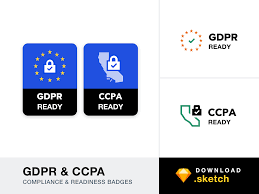Navigating the Data Privacy Maze: Businesses Grapple with GDPR and CCPA Compliance. In an era where data breaches and privacy concerns dominate headlines, businesses worldwide are facing mounting pressure to comply with stringent data privacy regulations. Among the most notable of these regulations are the General Data Protection Regulation (GDPR) in Europe and the California Consumer Privacy Act (CCPA) in the United States. As companies navigate the complex landscape of data privacy laws, the stakes for compliance have never been higher.
The GDPR, implemented in May 2018, revolutionized the way companies handle personal data of European Union citizens. It introduced strict guidelines on data collection, processing, and storage, along with hefty fines for non-compliance, reaching up to €20 million or 4% of global annual turnover, whichever is higher. Similarly, the CCPA, enacted in January 2020, grants California residents greater control over their personal information and imposes penalties for mishandling data, including fines of up to $7,500 per violation.
The implications of these regulations are profound, affecting businesses of all sizes and industries. For multinational corporations, compliance with multiple data privacy laws adds layers of complexity to their operations. Smaller enterprises may struggle to allocate resources for compliance efforts, risking financial repercussions and reputational damage in the event of a data breach.
To meet these challenges, businesses are adopting comprehensive risk management strategies focused on data protection and compliance. This includes investing in robust cybersecurity measures to safeguard sensitive information, implementing data encryption technologies, and conducting regular audits to ensure compliance with regulatory requirements.
Furthermore, businesses are prioritizing transparency and accountability in their data handling practices. This involves providing clear and concise privacy notices to consumers, obtaining explicit consent for data collection and processing activities, and honoring individuals’ rights to access, rectify, and delete their personal data.
However, compliance is an ongoing process, not a one-time task. With data privacy regulations continuously evolving and new laws emerging around the globe, businesses must remain vigilant and adaptable. This necessitates staying abreast of regulatory updates, conducting regular risk assessments, and integrating privacy by design principles into their products and services from inception.
Despite the challenges, there are opportunities for businesses that embrace data privacy as a core value. By prioritizing consumer trust and data integrity, companies can differentiate themselves in the marketplace, foster stronger customer relationships, and mitigate the risks associated with non-compliance. GDPR and CCPA Compliance
In conclusion, the impact of data privacy regulations like the GDPR and CCPA reverberates across the business landscape, reshaping how companies manage and protect personal data. As the digital economy continues to evolve, businesses must proactively address data privacy risks to safeguard their reputation, mitigate financial liabilities, and build a foundation of trust with consumers. Failure to do so could have far-reaching consequences in an increasingly data-driven world.










